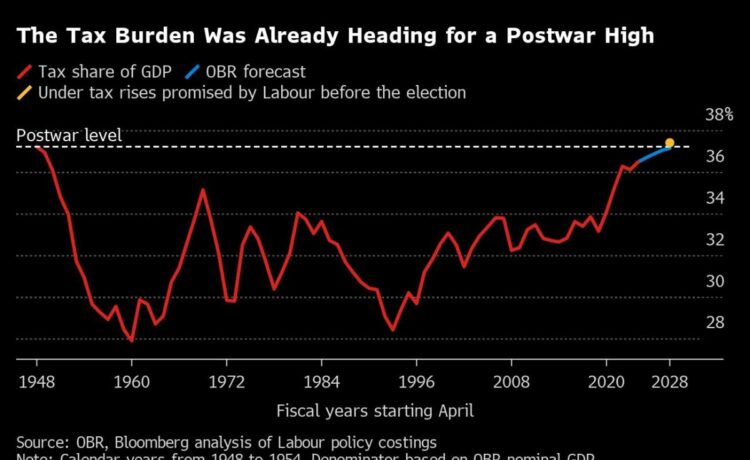(Bloomberg) — UK Chancellor of the Exchequer Rachel Reeves declined to rule out increasing the capital gains tax after warning that difficult decisions will be taken to fill a £22 billion ($28 billion) budget black hole.
Most Read from Bloomberg
Reeves, in an interview with Bloomberg Television Monday, said that the UK will strike the “right balance” on tax at the budget due Oct. 30, after speculation that she could target the capital gains levy.
“Of course you need to bring in the revenue to fund vital public services, but we’ve also got to grow the economy and I won’t do anything that makes it harder to achieve that economic growth and prosperity,” she said during a trip to attract investment from North America.
The remarks suggest that Reeves is leaving the option of increasing capital gains tax rates on the table as she tries to generate revenue to boost Britain’s struggling public services. Economists have speculated on such a move — potentially bringing them in line with income tax — after she ruled out tweaking the biggest revenue raisers: national insurance, income tax and value-added tax.
It’s prompted warnings that targeting the CGT could discourage investment from the UK at a time when Labour is attempting to lure in money from abroad.
One of the changes already being consulted on addresses the way carried interest — a portion of investment returns, shared between fund managers — is treated. Reeves on Monday suggested that private equity firms that co-invest on deals might receive more favorable treatment.
“If you put in your own capital, if you’ve got capital at risk, I think it is right that you benefit from a more generous form of tax relief,” she said. “But if it’s not your capital at risk, then it’s not right that you receive those tax breaks.”
Tough Decisions
Currently these fund managers pay a capital gains tax at a 28% rate on their investment returns rather than the higher income tax rate, which for many would be taxed at 45%.
Reeves has used her first few weeks as chancellor to warn of tough decisions ahead to shore up the public finances, as she also attempts to boost Britain’s anemic growth rates. She used an audit of public spending last week to accuse the previous Conservative government of leaving behind a number of undisclosed spending pressures, resulting in a £22 billion black hole for her to fill.
The audit fueled speculation that it aimed to lay the groundwork for tax rises in the October budget, with Reeves warning that there will be “difficult decisions across spending, welfare and tax.”
Reeves insisted on Monday that she wants to bring down Britain’s overall tax burden, which she warned “has got too high.”
“I want to bring that tax burden down because I want to make Britain the best place to start and grow a business and I want working people to keep more of their own money in their pockets,” she said.
When questioned on the possibility of increasing CGT, she said that “it’s always important when you’re deciding tax policy to strike the right balance.”
Reeves is visiting New York and Toronto this week in a bid to persuade executives that Britain is “open for business” again after Labour won last month’s general election.
The visit is part of a concerted push by the new government to reinvigorate Britain’s standing in the eyes of international investors after years of political instability and Brexit turmoil. Labour won a landslide victory in the July 4 vote on a promise to revive the UK’s lackluster economy and usher in a period of stability that Reeves hopes will attract investment.
Bloomberg reported last week that Citigroup Inc. Chief Executive Officer Jane Fraser and Blackstone Inc.’s Steve Schwarzman were among the Wall Street executives Reeves planned to meet on the trip. The UK government also announced last week that it will host an international investment summit on Oct. 14 as part of its global charm offensive.
Separately, Reeves hasn’t ruled out finding extra fiscal space by effectively removing an item tied to the central bank. Excluding losses linked to the Bank of England from the government’s measure of public debt could free up £16 billion of fiscal headroom by 2028-29, according to Bloomberg Economics estimates.
The chancellor did not dismiss pursuing such a step when questioned at the start of her visit to the US and Canada, according to the Financial Times.
Most Read from Bloomberg Businessweek
©2024 Bloomberg L.P.















